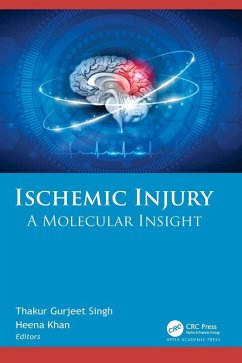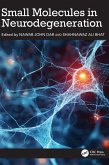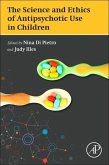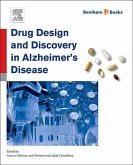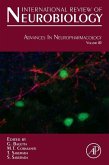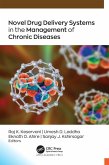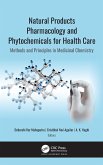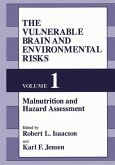Ischemic Injury
A Molecular Insight
Herausgeber: Singh, Thakur Gurjeet; Khan, Heena
Ischemic Injury
A Molecular Insight
Herausgeber: Singh, Thakur Gurjeet; Khan, Heena
- Gebundenes Buch
- Merkliste
- Auf die Merkliste
- Bewerten Bewerten
- Teilen
- Produkt teilen
- Produkterinnerung
- Produkterinnerung
Discuses studies on ischemic injury, emphasising the molecular-level mechanisms and the role, structure and mechanism of signaling pathways in the body. It also explains research on various important topics including new therapeutic molecules to combat this disease, etiologies of ischemic and hemorrhagic stroke, complications etc.
Andere Kunden interessierten sich auch für
![Small Molecules in Neurodegeneration Small Molecules in Neurodegeneration]() Small Molecules in Neurodegeneration190,99 €
Small Molecules in Neurodegeneration190,99 €![The Science and Ethics of Antipsychotic Use in Children The Science and Ethics of Antipsychotic Use in Children]() The Science and Ethics of Antipsychotic Use in Children38,99 €
The Science and Ethics of Antipsychotic Use in Children38,99 €![Drug Design and Discovery in Alzheimer's Disease Drug Design and Discovery in Alzheimer's Disease]() Drug Design and Discovery in Alzheimer's Disease71,99 €
Drug Design and Discovery in Alzheimer's Disease71,99 €![Advances in Neuropharmacology Advances in Neuropharmacology]() Advances in Neuropharmacology127,99 €
Advances in Neuropharmacology127,99 €![Novel Drug Delivery Systems in the Management of Chronic Diseases Novel Drug Delivery Systems in the Management of Chronic Diseases]() Novel Drug Delivery Systems in the Management of Chronic Diseases219,99 €
Novel Drug Delivery Systems in the Management of Chronic Diseases219,99 €![Natural Products Pharmacology and Phytochemicals for Health Care Natural Products Pharmacology and Phytochemicals for Health Care]() Natural Products Pharmacology and Phytochemicals for Health Care180,99 €
Natural Products Pharmacology and Phytochemicals for Health Care180,99 €![The Vulnerable Brain and Environmental Risks The Vulnerable Brain and Environmental Risks]() Robert IsaacsonThe Vulnerable Brain and Environmental Risks60,99 €
Robert IsaacsonThe Vulnerable Brain and Environmental Risks60,99 €-
-
-
Discuses studies on ischemic injury, emphasising the molecular-level mechanisms and the role, structure and mechanism of signaling pathways in the body. It also explains research on various important topics including new therapeutic molecules to combat this disease, etiologies of ischemic and hemorrhagic stroke, complications etc.
Produktdetails
- Produktdetails
- Verlag: Apple Academic Press
- Seitenzahl: 538
- Erscheinungstermin: 22. November 2024
- Englisch
- Abmessung: 254mm x 178mm x 32mm
- Gewicht: 1188g
- ISBN-13: 9781774915400
- ISBN-10: 1774915405
- Artikelnr.: 70975078
- Herstellerkennzeichnung
- Libri GmbH
- Europaallee 1
- 36244 Bad Hersfeld
- gpsr@libri.de
- Verlag: Apple Academic Press
- Seitenzahl: 538
- Erscheinungstermin: 22. November 2024
- Englisch
- Abmessung: 254mm x 178mm x 32mm
- Gewicht: 1188g
- ISBN-13: 9781774915400
- ISBN-10: 1774915405
- Artikelnr.: 70975078
- Herstellerkennzeichnung
- Libri GmbH
- Europaallee 1
- 36244 Bad Hersfeld
- gpsr@libri.de
Thakur Gurjeet Singh, PhD, MPharm, has 16 years of experience in industry, research, and teaching. He is currently Dean of the Chitkara College of Pharmacy, Chitkara University, Punjab, India. He is engaged with projects on interception of nicotine, morphine, alcohol dependence, ischemia, diabetic neuropathy and nephropathy toxicology, epilepsy, Alzheimer's disease, and stem cell research studies. He has attended UGC networking courses and various preclinical and clinical research training programs. A prolific author and researcher, he has many publications and patents to his credit. He has attended national and international conferences and has guided MPharm and PhD students. He is a reviewer for various highly reputed international journals. Dr. Singh is a member secretary of the Committee for the Purpose of Control and Supervision of Experiments on Animals and is the In-Charge of the animal house facility at the Chitkara College of Pharmacy. Heena Khan, PhD, MPharm, has over five years of experience in research. She is working as a Research Fellow at Chitkara University, Punjab, India, where she is engaged with several projects on stroke, diabetes, Alzheimer's disease, and Parkinson's disease. She has more than 30 research and review publications to her credit and is a reviewer for several international journals. She has participated and attended several national and international conferences. She is also a member of the International Society for Pharmacoeconomics and Outcomes Research.
1. Stroke Insight 2. Myocardial Ischemic-Reperfusion Injury 3. Preclinical
and Clinical Aspects of I-R Injuries 4. Molecular Aspects of
Ischemic-Reperfusion Injury 5. Role of Mitochondria in Ischemic-Reperfusion
Injury 6. Stroke Effect in Daily Life and Therapeutics, Complications for
Prevention of Stroke 7. Etiopathogenesis and Molecular Targets in Cerebral
Ischemia: Current Understanding of Stroke and Therapeutic Approaches 8.
Expatiating the Pivotal Role of Matrix Metalloproteinases and Blood-Brain
Barrier Disruption in Ischemic Stroke: Molecular Insights and Therapeutic
Targets 9. Acute Ischemic Stroke in COVID-19 Patients 10. Neurotransmission
Imbalance: A Major Factor in the Worsening of Ischemic Injury 11. Role of
the Renin-Angiotensin-Aldosterone System (RAAS) in Amelioration of Stroke
Pathophysiology 12. Stroke and Diabetes in Vitamin D Deficiency: Prospects
of Intertwined Pathobiologies 13. Remote Ischemic Post-Conditioning: An
Overview 14. Sex-Based Differences in Acute Kidney Injury: Lessons from
Renal Ischemia-Reperfusion Injury Model in Rodents 15. Critical Overview of
Conditioning Techniques and Their Current Status in the Treatment of
Myocardial Ischemia-Reperfusion Injury 16. Involvement of Platelets in
Myocardial Ischemia and Reperfusion Injury 17. Recent Advancements in
Strategies for Treatment of Cerebral Ischemia 18. Recent Therapeutic
Approaches Toward the Management of Ischemic Heart Disease 19.
Nanotechnology-Assisted Treatment for Ischemic Heart Disease and Recent
Patents 20. Major Risk Factors Involved in the Pathobiology of Ischemic
Brain and Heart Disorders 21. Modulating Mitogen-Activated Protein Kinase
(MAPK) Downstream Signaling Pathways in Cerebral Ischemic Hemorrhages 22.
Implication of Mitogen-Activated Protein Kinase (MAPK) in Cerebral Stroke
23. Regulation of JNK Signaling Pathway in Ischemia-Reperfusion Injury 24.
Role of Glycogen Synthase Kinase-3? (Gsk-3?) in Intracranial Haemorrhage
25. Role of GSK-3 Inhibition in Modulating the Pathology of Stroke 26.
Regulation of NRF-2 Signaling Pathway in Ischemia-Reperfusion Injury 27.
Regulation of PI3K-AKT Signaling Pathway in Ischemia-Reperfusion Injury 28.
COVID-19 and Ischemic Stroke: Advancements and Challenges
and Clinical Aspects of I-R Injuries 4. Molecular Aspects of
Ischemic-Reperfusion Injury 5. Role of Mitochondria in Ischemic-Reperfusion
Injury 6. Stroke Effect in Daily Life and Therapeutics, Complications for
Prevention of Stroke 7. Etiopathogenesis and Molecular Targets in Cerebral
Ischemia: Current Understanding of Stroke and Therapeutic Approaches 8.
Expatiating the Pivotal Role of Matrix Metalloproteinases and Blood-Brain
Barrier Disruption in Ischemic Stroke: Molecular Insights and Therapeutic
Targets 9. Acute Ischemic Stroke in COVID-19 Patients 10. Neurotransmission
Imbalance: A Major Factor in the Worsening of Ischemic Injury 11. Role of
the Renin-Angiotensin-Aldosterone System (RAAS) in Amelioration of Stroke
Pathophysiology 12. Stroke and Diabetes in Vitamin D Deficiency: Prospects
of Intertwined Pathobiologies 13. Remote Ischemic Post-Conditioning: An
Overview 14. Sex-Based Differences in Acute Kidney Injury: Lessons from
Renal Ischemia-Reperfusion Injury Model in Rodents 15. Critical Overview of
Conditioning Techniques and Their Current Status in the Treatment of
Myocardial Ischemia-Reperfusion Injury 16. Involvement of Platelets in
Myocardial Ischemia and Reperfusion Injury 17. Recent Advancements in
Strategies for Treatment of Cerebral Ischemia 18. Recent Therapeutic
Approaches Toward the Management of Ischemic Heart Disease 19.
Nanotechnology-Assisted Treatment for Ischemic Heart Disease and Recent
Patents 20. Major Risk Factors Involved in the Pathobiology of Ischemic
Brain and Heart Disorders 21. Modulating Mitogen-Activated Protein Kinase
(MAPK) Downstream Signaling Pathways in Cerebral Ischemic Hemorrhages 22.
Implication of Mitogen-Activated Protein Kinase (MAPK) in Cerebral Stroke
23. Regulation of JNK Signaling Pathway in Ischemia-Reperfusion Injury 24.
Role of Glycogen Synthase Kinase-3? (Gsk-3?) in Intracranial Haemorrhage
25. Role of GSK-3 Inhibition in Modulating the Pathology of Stroke 26.
Regulation of NRF-2 Signaling Pathway in Ischemia-Reperfusion Injury 27.
Regulation of PI3K-AKT Signaling Pathway in Ischemia-Reperfusion Injury 28.
COVID-19 and Ischemic Stroke: Advancements and Challenges
1. Stroke Insight 2. Myocardial Ischemic-Reperfusion Injury 3. Preclinical
and Clinical Aspects of I-R Injuries 4. Molecular Aspects of
Ischemic-Reperfusion Injury 5. Role of Mitochondria in Ischemic-Reperfusion
Injury 6. Stroke Effect in Daily Life and Therapeutics, Complications for
Prevention of Stroke 7. Etiopathogenesis and Molecular Targets in Cerebral
Ischemia: Current Understanding of Stroke and Therapeutic Approaches 8.
Expatiating the Pivotal Role of Matrix Metalloproteinases and Blood-Brain
Barrier Disruption in Ischemic Stroke: Molecular Insights and Therapeutic
Targets 9. Acute Ischemic Stroke in COVID-19 Patients 10. Neurotransmission
Imbalance: A Major Factor in the Worsening of Ischemic Injury 11. Role of
the Renin-Angiotensin-Aldosterone System (RAAS) in Amelioration of Stroke
Pathophysiology 12. Stroke and Diabetes in Vitamin D Deficiency: Prospects
of Intertwined Pathobiologies 13. Remote Ischemic Post-Conditioning: An
Overview 14. Sex-Based Differences in Acute Kidney Injury: Lessons from
Renal Ischemia-Reperfusion Injury Model in Rodents 15. Critical Overview of
Conditioning Techniques and Their Current Status in the Treatment of
Myocardial Ischemia-Reperfusion Injury 16. Involvement of Platelets in
Myocardial Ischemia and Reperfusion Injury 17. Recent Advancements in
Strategies for Treatment of Cerebral Ischemia 18. Recent Therapeutic
Approaches Toward the Management of Ischemic Heart Disease 19.
Nanotechnology-Assisted Treatment for Ischemic Heart Disease and Recent
Patents 20. Major Risk Factors Involved in the Pathobiology of Ischemic
Brain and Heart Disorders 21. Modulating Mitogen-Activated Protein Kinase
(MAPK) Downstream Signaling Pathways in Cerebral Ischemic Hemorrhages 22.
Implication of Mitogen-Activated Protein Kinase (MAPK) in Cerebral Stroke
23. Regulation of JNK Signaling Pathway in Ischemia-Reperfusion Injury 24.
Role of Glycogen Synthase Kinase-3? (Gsk-3?) in Intracranial Haemorrhage
25. Role of GSK-3 Inhibition in Modulating the Pathology of Stroke 26.
Regulation of NRF-2 Signaling Pathway in Ischemia-Reperfusion Injury 27.
Regulation of PI3K-AKT Signaling Pathway in Ischemia-Reperfusion Injury 28.
COVID-19 and Ischemic Stroke: Advancements and Challenges
and Clinical Aspects of I-R Injuries 4. Molecular Aspects of
Ischemic-Reperfusion Injury 5. Role of Mitochondria in Ischemic-Reperfusion
Injury 6. Stroke Effect in Daily Life and Therapeutics, Complications for
Prevention of Stroke 7. Etiopathogenesis and Molecular Targets in Cerebral
Ischemia: Current Understanding of Stroke and Therapeutic Approaches 8.
Expatiating the Pivotal Role of Matrix Metalloproteinases and Blood-Brain
Barrier Disruption in Ischemic Stroke: Molecular Insights and Therapeutic
Targets 9. Acute Ischemic Stroke in COVID-19 Patients 10. Neurotransmission
Imbalance: A Major Factor in the Worsening of Ischemic Injury 11. Role of
the Renin-Angiotensin-Aldosterone System (RAAS) in Amelioration of Stroke
Pathophysiology 12. Stroke and Diabetes in Vitamin D Deficiency: Prospects
of Intertwined Pathobiologies 13. Remote Ischemic Post-Conditioning: An
Overview 14. Sex-Based Differences in Acute Kidney Injury: Lessons from
Renal Ischemia-Reperfusion Injury Model in Rodents 15. Critical Overview of
Conditioning Techniques and Their Current Status in the Treatment of
Myocardial Ischemia-Reperfusion Injury 16. Involvement of Platelets in
Myocardial Ischemia and Reperfusion Injury 17. Recent Advancements in
Strategies for Treatment of Cerebral Ischemia 18. Recent Therapeutic
Approaches Toward the Management of Ischemic Heart Disease 19.
Nanotechnology-Assisted Treatment for Ischemic Heart Disease and Recent
Patents 20. Major Risk Factors Involved in the Pathobiology of Ischemic
Brain and Heart Disorders 21. Modulating Mitogen-Activated Protein Kinase
(MAPK) Downstream Signaling Pathways in Cerebral Ischemic Hemorrhages 22.
Implication of Mitogen-Activated Protein Kinase (MAPK) in Cerebral Stroke
23. Regulation of JNK Signaling Pathway in Ischemia-Reperfusion Injury 24.
Role of Glycogen Synthase Kinase-3? (Gsk-3?) in Intracranial Haemorrhage
25. Role of GSK-3 Inhibition in Modulating the Pathology of Stroke 26.
Regulation of NRF-2 Signaling Pathway in Ischemia-Reperfusion Injury 27.
Regulation of PI3K-AKT Signaling Pathway in Ischemia-Reperfusion Injury 28.
COVID-19 and Ischemic Stroke: Advancements and Challenges

